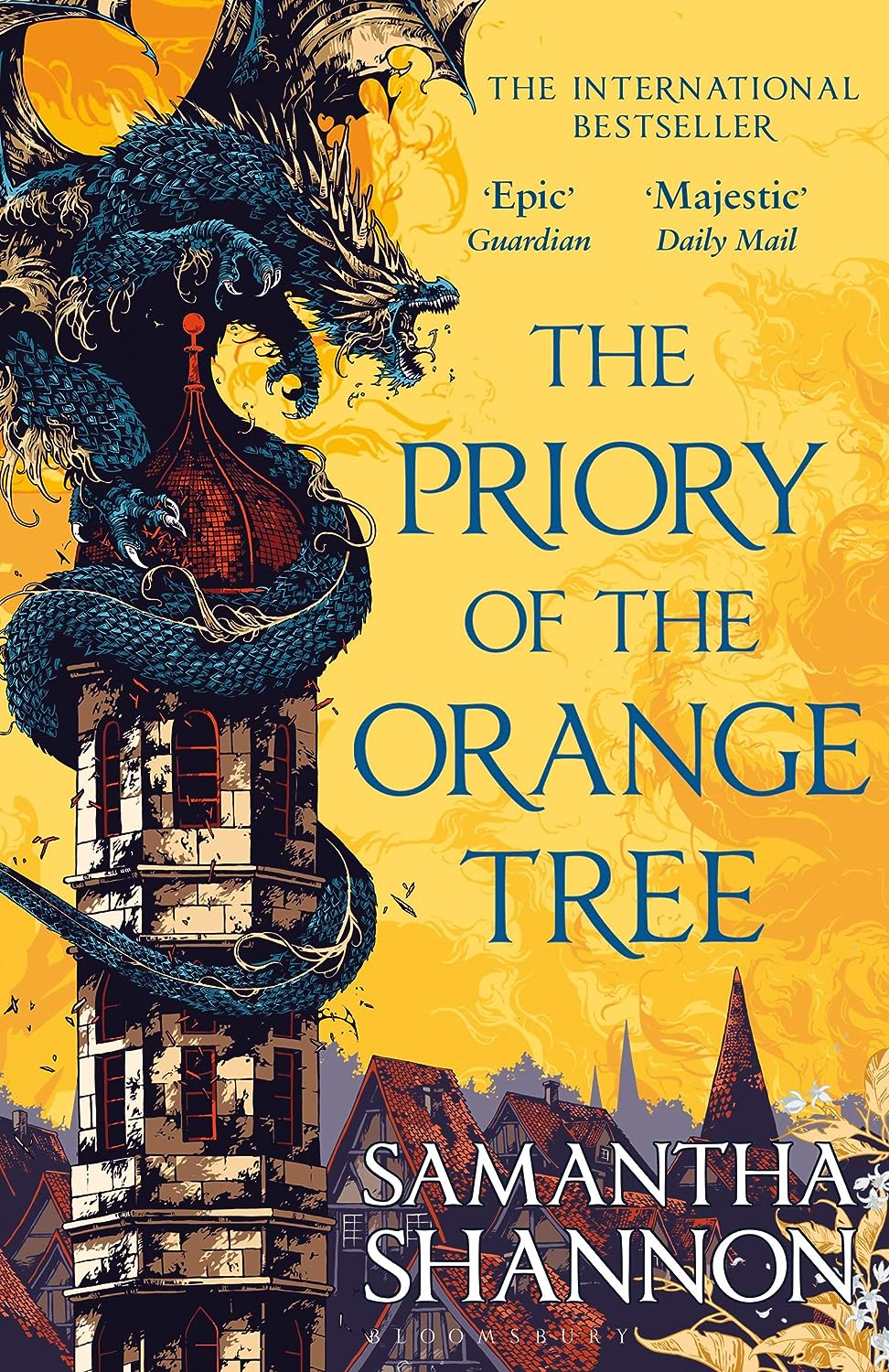
The Priory of the Orange Tree
Forty-Six
by Shannon, SamanthaIn this chapter, Ead returns to the kitchens of the Priory, reminiscing about her childhood and reconnecting with Tulgus, the head cook. She subtly inquires about the Prioress’s sun wine, masking her true intentions while observing Loth, who appears drugged with dreamroot. Ead seizes an opportunity to steal a pinch of powder from the spice jars, hinting at her clandestine plans. The scene establishes her calculated demeanor and the tension of her impending actions, as she balances nostalgia with the urgency of her mission.
Ead continues her day by maintaining a facade of normalcy, practicing archery under the watchful eyes of the Silver Damsels. Her precision and composure conceal her inner turmoil. Returning to her sunroom, she discovers her belongings missing, signaling that her escape is imminent. The chapter builds suspense as Ead prepares for her departure, steeling herself for the point of no return. Her resolve hardens, reflecting her determination to defy the Prioress and protect those beyond the Priory’s narrow focus.
As night falls, Ead orchestrates her plan, drugging the wine meant for the Prioress and using her hidden knife and travel clothes to escape. She employs an ancient technique called “candling” to incapacitate the guards, showcasing her rare skills. The tension peaks as she enters the Prioress’s chamber, only to find her awake and aware of the betrayal. The Prioress’s disdain for Ead’s broader worldview—rooted in her mother’s influence—reveals the ideological rift between them.
The confrontation between Ead and the Prioress underscores the chapter’s central conflict: the Priory’s isolationism versus Ead’s belief in protecting all humanity. The Prioress condemns Ead’s allegiance to Inys and the East, framing it as a betrayal of the Mother’s teachings. Ead’s silent defiance and the Prioress’s venomous rhetoric highlight the deeper stakes of their clash, setting the stage for Ead’s rebellion and the broader struggle against the Priory’s rigid dogma.
FAQs
1. What is Ead’s primary objective in this chapter, and what risks does she take to achieve it?
Answer:
Ead’s primary objective is to retrieve the jewel from the Prioress in order to return to Inys and protect Queen Sabran. She takes significant risks, including drugging the Prioress’s wine with dreamroot, stealing spices, and using an ancient skill called “candling” to incapacitate the Red Damsels guarding the Prioress’s chamber. These actions are treasonous within the Priory’s hierarchy and could result in severe punishment if discovered. Her careful planning—such as maintaining a calm demeanor during archery practice and hiding her preparations—shows the high stakes of her mission.2. How does the Prioress’s worldview contrast with Ead’s (and her birthmother Zāla’s) beliefs about the Priory’s role?
Answer:
The Prioress believes the Priory should focus solely on protecting the South, as she claims the Mother intended. She views expanding their protection to other regions—especially the East, which worships sea wyrms—as a dangerous overextension. In contrast, Ead (influenced by her birthmother Zāla) believes the Priory should protect all humankind, including foreign rulers like Sabran. This ideological conflict drives Ead’s rebellion, as she sees the Prioress’s isolationism as a failure to confront broader threats like the Nameless One.3. Analyze the significance of the “candling” technique and its symbolic implications.
Answer:
Candling, an ancient skill no longer taught in the Priory, involves igniting a tiny flame within a living body to suffocate consciousness. Its rarity highlights how Ead’s knowledge sets her apart from her peers. Symbolically, it represents the hidden fire of her defiance—subtle but potent enough to dismantle the Priory’s authority. The technique also mirrors her internal struggle: just as she smothers the guards’ senses, she must suppress her doubts to commit to her mission. Its use underscores the chapter’s tension between tradition and rebellion.4. How does the chapter build suspense around Ead’s escape plan?
Answer:
Suspense is built through meticulous details of Ead’s preparations (e.g., drugging the wine, stealing dreamroot, feigning normalcy) and the constant risk of discovery. The empty wine cup and the Prioress’s sudden confrontation create a pivotal moment of uncertainty. Additionally, sensory details—like the wind extinguishing the lamp or the sweat on the Prioress’s brow—heighten tension. The repeated references to “no return” and Aralaq’s silent assistance deepen the stakes, leaving readers questioning whether Ead’s plan will succeed or collapse under the Prioress’s vigilance.5. What does the Prioress’s reaction reveal about her leadership and the Priory’s values?
Answer:
The Prioress’s venomous tone toward Zāla’s ideals exposes her rigid, fear-driven leadership. She dismisses global cooperation as weakness, framing it as a betrayal of the Mother’s will. Her suspicion of Ead’s “Inysh poison” reflects xenophobia and a dogmatic adherence to tradition. By hoarding the jewel and condemning Zāla’s legacy, she prioritizes control over adaptability—a stark contrast to Ead’s pragmatic, inclusive approach. This confrontation underscores the Priory’s ideological stagnation under the Prioress’s rule.
Quotes
1. “The point of no return.”
This simple yet powerful statement marks Ead’s decisive moment as she prepares to betray the Priory. It encapsulates the gravity of her choice and the irreversible consequences that will follow.
2. “The Mother would not have watched while the world burned.”
This quote reveals Ead’s moral justification for her actions, contrasting her worldview with the Prioress’s isolationist policies. It represents the core ideological conflict driving Ead’s rebellion.
3. “You must think me a fool.”
The Prioress’s cold confrontation reveals she anticipated Ead’s betrayal. This moment dramatically escalates the tension and sets up their ideological confrontation about the Priory’s purpose.
4. “Zālā would have had us open our arms to the world and, in doing so, expose our bellies to the sword.”
The Prioress’s argument encapsulates her isolationist philosophy, using vivid metaphorical language to express her belief that protecting beyond the South would weaken their position against the Nameless One.
5. “It was inevitable that Inys would poison you.”
This cutting remark from the Prioress suggests Ead’s time in the foreign court fundamentally changed her perspective, framing their conflict as one between pure Southern values and outside influence.
